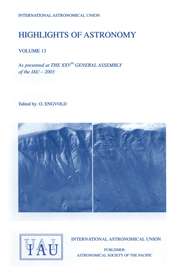Article contents
X-Ray Bursts
Published online by Cambridge University Press: 30 March 2016
Extract
Most of the variable phenomena of high-luminosity (≳1036 erg s−1) stellar X-ray sources can be explained, at least qualitatively, within the general framework of binary accretion models in which thermal X-rays are emitted in the vicinity of a neutron star or blackhole by plasma that has flowed downhill from the surface of a nuclear burning companion and been heated by conversion of its gravitational potential energy. The yield of X-ray energy in this process is so high, exceeding in some cases 0.1c2 per unit mass, that X-ray luminosities in excess of 104L⊙ can be generated with accretion rates of only ˜10−B M⊙ per year. Since the transfer process depends strongly on many parameters that specify the relevant properties of two stars and their interaction, one finds a remarkable variety and range of X-ray phenomena. If the compact object is a magnetized neutron star, rotation will cause its X-ray emission pattern to sweep over a distant observer and thereby produce regular pulsations like those observed with periods in the range from 1 to 103 seconds. Orbital motions can cause regular eclipses and absorption dips like those observed with periods in the range from hours to days. Changes in the rate of mass loss by the nuclear burning star or in the transfer efficiency can account for the variations in intrinsic X-ray luminosities that appear as flares, novae and on-off transitions. Irregularities in the flow of plasma near the compact star can also affect the intrinsic luminosity and appear as erratic fluctuations, spikes and shot-noise in the observed intensity.
- Type
- Joint Dicussions
- Information
- Copyright
- Copyright © Reidel 1977
References
- 1
- Cited by


